Online Culture
Self-proclaimed ‘Christian’ entrepreneur offers filter to stop LGBTQ cult
New company claims it protects kids from LGBTQ Cult: “Christian tech startup responds to Pride Month helps parents block LGBTQ+ propaganda”
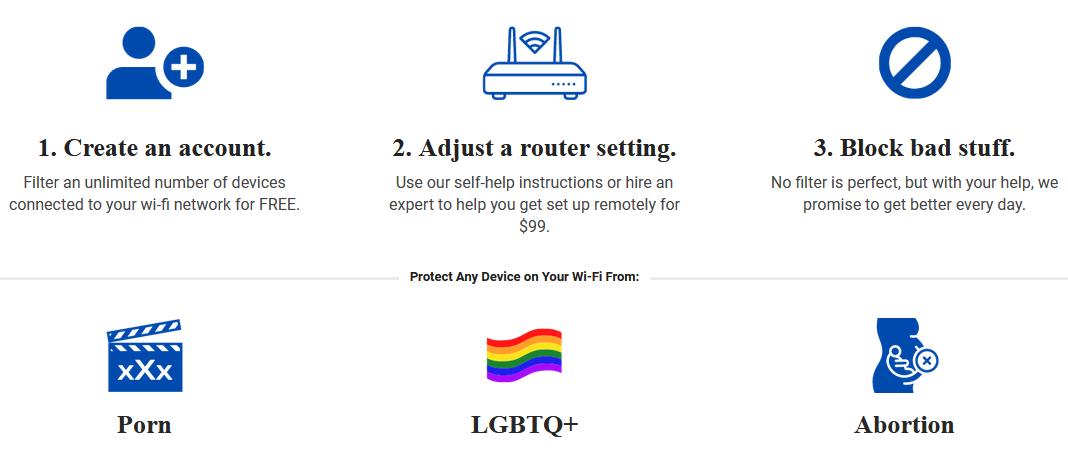
WOODSTOCK, GA. – A self-proclaimed Christian entrepreneur announced in a press release that he had launched an internet filtering service designed to protect children from indoctrination into what he says is a “dangerous LGBTQ cult.”
Michael Lee Mason, the founder of FreeFiltering, based in a small hamlet northeast of Marietta, Georgia, introduced his product on June 1st, attacking LGBTQ Pride month writing; “While the world celebrates Pride for the entire month of June, we mourn the fact that our nation has embraced the sin of pride as a virtue. We applaud the parents who are putting in the enormous effort necessary to properly form their kids’ consciences in a culture that has become so hostile to holiness.”
“Christian parents are rightfully concerned about the way their kids are being systematically exposed to false ideas about human sexuality at school. Then, those ideas are all-too-easily reinforced with unfettered internet access at home. A couple clicks can spiral into catastrophic physical and spiritual harm,” Mason said.

Mason ended stating, “[…] we anticipate being censored by the major digital ad platforms because of our commitment to historic Christian values,” says Mason. The company hopes that generous donors will step forward to help underwrite the tremendous ongoing expense of providing their services to Christian families across the country. Mason says the company will not survive.”
Photograph of Michael Lee Mason via Facebook
Online Culture
From TransTape to risk maps, how trans people use technology
Oliver Haimson’s book, ‘Trans Technologies,’ will be published in February
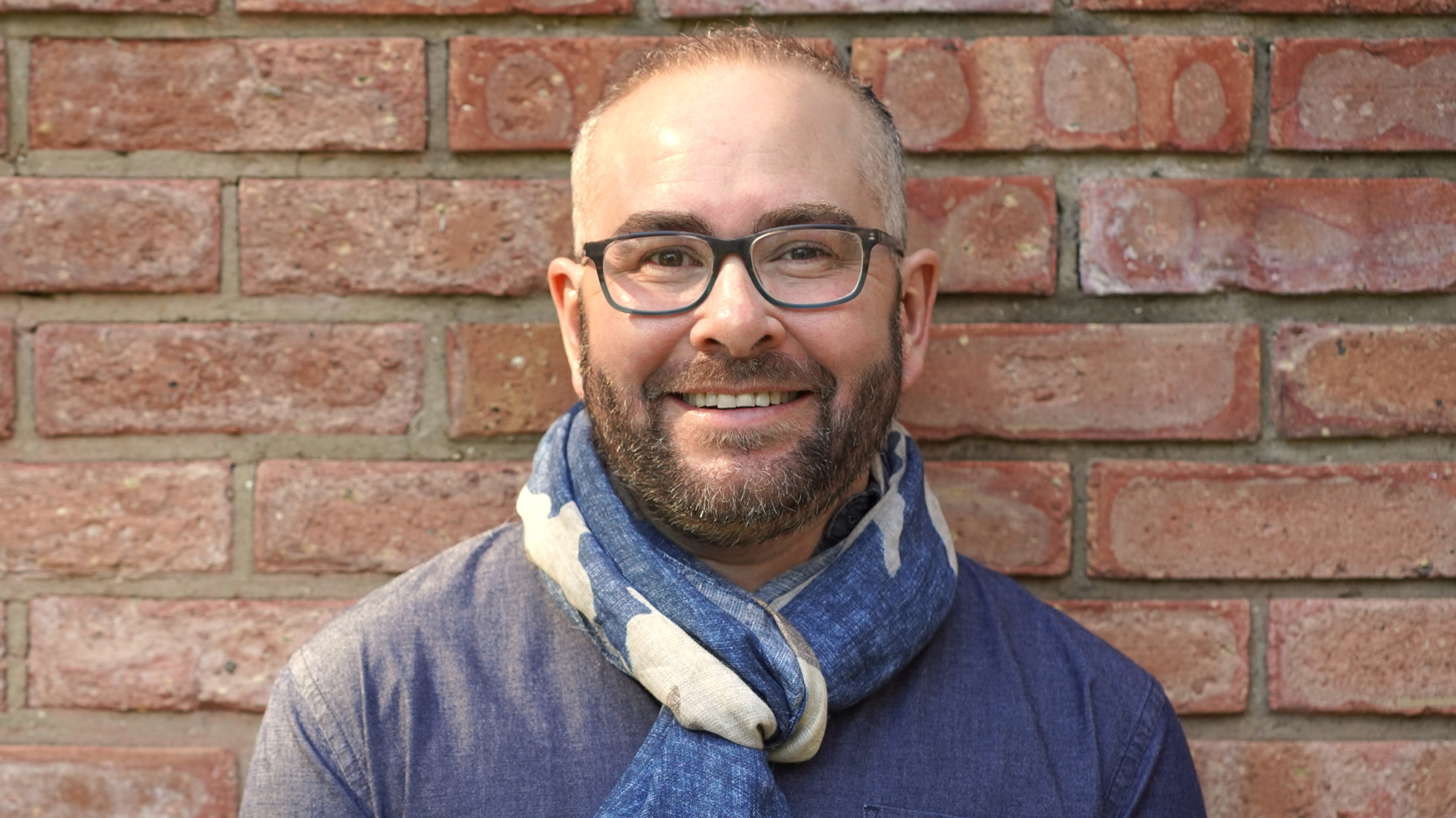
In 2021, trans folks on Twitter debated about the ethics and usefulness of a venture-funded app suite called Euphoria, meant to facilitate transitions.
Much of that landscape has disappeared. The Euphoria apps shuttered. Twitter is now X and trans folks are no longer debating on it, though they actively debate on Bluesky.
While the trans world moved on, one trans guy didn’t. Oliver Haimson was fascinated. In 2019, he opened a note on his phone titled “Trans Technology” and started a running list. It had four initial entries:
- MyTransHealth, a Kickstarter-funded health resource site.
- Solace, the first of the Euphoria app suite.
- Transdr, an app ostensibly for transgender dating.
- TransTech Social Enterprises, a technology skill-building community for trans folks
It demonstrated an emerging trend the trans academic was interested in: the intersection between trans people and technology. This was a very new concept, termed by Haimson and three others in a paper published that year.
The four entries spanned the breadth of what trans technology could be. Trans people were harnessing technology to their unique struggles like access to jobs and medical information. And, technologists were seeing trans people as a new market for products, which the Euphoria app founder called a $200 billion industry—a number frequently repeated by conservative commentators. Some founders were trans, others were cis. Some entities were profit-oriented, others were not.
The information studies student was “trying to figure out if this could be an acceptable research area in academic computing spaces.” To his delight, it was warmly received so he kept digging.
Six years and several papers later, Haimson’s list has grown to 100 and has turned from a phone note to a unique body of scholarly work. Now an assistant professor at the University of Michigan School of Information, Haimson’s first book, titled Trans Technologies, will be published by MIT Press in February 2025.
The Blade read a copy of Haimson’s manuscript and chatted with him about the state of tech and trans people. The book is drawn from Haimson’s interviews with the creators of all 100 entries on the list.
“Technology can open up these new possibilities for trans people, but at the same time, trans identity opens up new possibilities for technology and what it means and what it can do.”
Haimson emphasizes these 100 are just a sample. “I kind of could have kept going forever,” he says. “I really didn’t intend to talk to that many people, because usually with these interview studies we talked to about 25 people.”
At the end of every interview, Haimson asked participants if there was anyone else who may be a good candidate—a method called snowball sampling—and the project just kept growing.
“I just had to cut myself off at around 100 interviews, because I wanted to actually move forward with the analysis and writing,” he says.
Many of those that Haimson interviewed may be recognizable. He spoke to trans pioneer Lynn Conway before her death this June. He spoke to trans journalist Erin Reed, known for her informed consent clinic and trans risk maps.
If the names are not recognizable, the projects often are. While Kai Jackson may not be a trans household name, TransTape, a technology highlighted in the book, is ubiquitous in most transmasculine communities. The same could be said with the many interviewee names associated with TransLifeline or Plume.
The technologies profiled were diverse, bound by a definition given to Haimson by artist and theorist Sandy Stone in an interview—“Technology is anything that extends your agency”—which in turn had been drawn from media scholar Marshall McCluhan’s 1964 definition of technology as “any extension of ourselves.” Haimson likes Stone’s wording better.
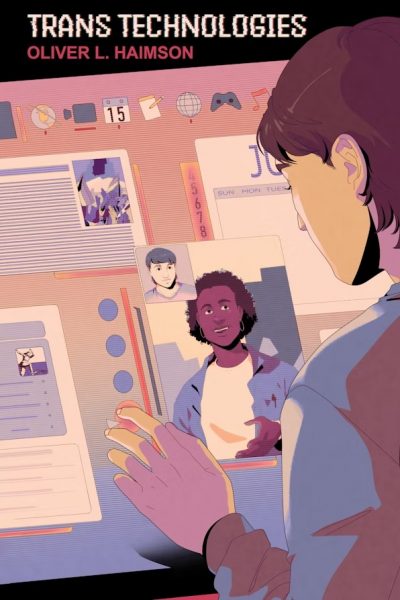
But ultimately, it was Haimson’s job to define the bounds of trans technology. Was it a piece of technology created by a transgender person? Was it a piece of tech used primarily by transgender people? Was it a piece of tech only concerned with “trans things,” whatever those are?
Drawn from his hours of interviews, Haimson proposed there were two definitions of trans technology.
“One is a more practical definition,” he says. “Trans technology is a kind of technology that can help address some of the needs and challenges that trans people and trans communities face.” He explains that these technologies address the practical needs of the trans community, ranging from underemployment to lack of access to healthcare to risk of violence.
That can’t encapsulate everything though. “There’s also this more theoretical definition,” Haimson says. “A lot of the technologies that I talk about in the book are creating these new trans worlds, new possibilities that might not have been possible before thinking about technology and transness together.”
“Transness is about change and transition and crossing over boundaries and borders,” says Haimson. “There are ways that that could apply to technology.”
Haimson argues that trans people and transness bring something unique and powerful to the tech space. “Technology can open up these new possibilities for trans people, but at the same time, trans identity opens up new possibilities for technology and what it means and what it can do.”
As “exciting and big and interesting as this world is,” Haimson emphasizes that the trans-tech space does not fully represent the diversity of the trans community
“It was pretty clear early on in the study that the people who were creating trans technologies were most likely white, highly educated, [and of a] higher socioeconomic status,” he says. “Many of the people I interviewed have Ph.D.s or other types of graduate degrees, and that doesn’t line up with the broader trans population.”
Per the 2020 Transgender Survey, only 18% of trans people have completed a bachelor’s degree or higher. This compares to 37.9% of the U.S. population, per the U.S. Census as of 2021.
“A lot of these creators, even people who are creating really amazing things, are creating based on their own experiences,” Haimson explains. “Many trans technologies are more likely to meet the needs of people who are white and highly educated and of higher socioeconomic status.”
He advocates for a community-based design approach that involves the whole of the trans community. “There are some things that are really needed,” he says, citing newer efforts to monitor violence, “They are important because they are coming from what the community needs, not just the more privileged members of the community.”
Though many technologies Haimson researched address with the practical issues of healthcare, employment, and safety, others grapple with the complex, varied emotional experiences of the trans community.
He cites creator Sasha Winter’s “game jams” where videogame developers come together to make and share games under the topics of “trans fucking rage” and “trans joy.” Developers created more than 100 unique video games for the jams, many of which are available for free or cheap download.
“I think this is such a great example of trans technologies more broadly,” Haimson reflects, “All of us hold this rage and joy together at once.”
Online Culture
TikTok celebrates Pride with honoree list, online and in-person events
Inaugural LGBTQ Visionary Voices list recognizes creators

Social media giant TikTok will spotlight LGBTQ content creators and small business owners with an inaugural list of honorees to celebrate Pride month, according to a press release on the company’s website. In addition, the company will embark on a campaign that includes webinars, community events and a ball in Los Angeles.
“We’re thrilled to celebrate Pride month by honoring the history-making impact of our diverse queer community with this year’s LGBTQ+ TikTok Visionary Voices List,” said Shavone Charles, TikTok’s head of diversity and inclusion communications.
The 2023 LGBTQ+ Visionary Voices list recognizes 15 queer TikTok creators who use the platform to “educate, entertain and advocate for the LGBTQ+ community,” according to the release. Honorees on the list span three categories — creators, small-owned businesses and industry disruptors — and feature popular hitmakers Saucy Santana and Baby Tate and social media sensation The Old Gays.
Jae Gurley, another of the honorees, plans to use this recognition as an opportunity to promote lucid education about Pride and cultivate a deeper understanding behind it. Gurley is well-known for using performance and storytelling to create lifestyle content that highlights their journey to self-discovery as a Black femme nonbinary person and encourages users to live their “most confident Bougie B life.”
“I feel like a lot of the time online, Pride is portrayed as this big gay party and it is, but it’s also a protest and I want my community to understand why we still have to fight,” they said “Why we need to continue to take up space, and not be satisfied with where we are, cause it can be taken away in a second.”
TikTok’s Pride month campaign, titled “You Belong Here,” will celebrate the LGBTQ community through a series of in-app initiatives, LIVE events and special programming themed around hashtags including: #ForYourPride, #PrideAnthems and #LGBTQBusiness, according to the company’s release.
One of the events, “TikTok Takeoff: Queer Inclusivity in Marketing Webinar,” will be hosted on June 13. The online event will platform the stories of LGBTQ+ small and medium-sized businesses at a roundtable discussion. Business owners will discuss their journey taking off on TikTok and strategies they use on the application to engage with new diverse audiences and drive real-world success for their brands.
On the company-facing end, employees will get to participate in programming organized by its employee resource group including LGBTQ film screenings and Pride marches.
“You Belong Here is more than a campaign — it’s our commitment to the LGBTQIA+ community on TikTok,” read the company’s release. “We believe that people should be able to connect with one another, express themselves authentically, and thrive on the platform. And we know that fostering an inclusive space requires prioritizing the needs of our community.”
Online Culture
Extremist rapper promoted by Lauren Boebert burns Pride flags
Tyson James released new video on Tuesday
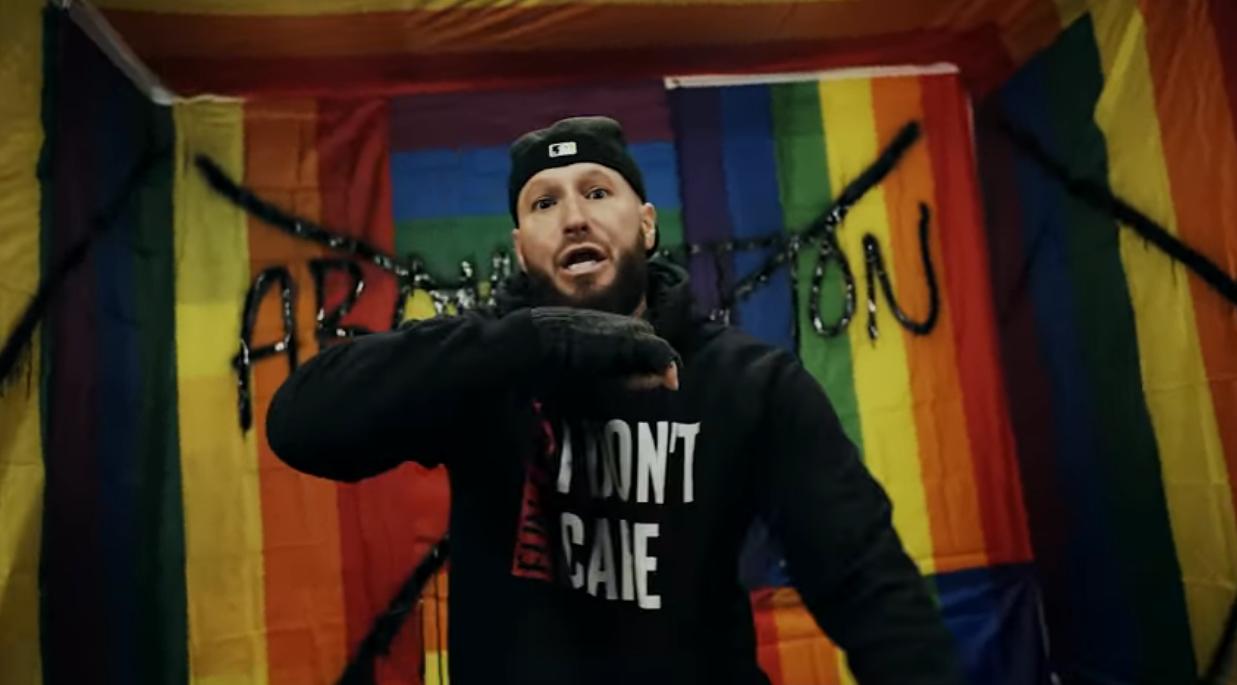
Tyson James, a right-wing homophobic extremist rapper, has released a new video Tuesday in which he celebrates being called a bigot while setting fire to LGBTQ Pride flags.
James rose to notoriety and acclamation in far-right circles after he created a song celebrating Kyle Rittenhouse, the 17-year-old from Antioch, Ill., who fatally shot two men and wounded another on Aug. 25, 2020, in Kenosha, Wis. The shootings occurred during the protests, riots, and civil unrest that followed the non-fatal shooting of a black man, Jacob Blake, by a white police officer.
Rittenhouse was found not guilty by a jury for the deaths of the two victims.
Twitter activists working to expose right wing extremism under the screenname/handle of @patriottakes noted that James has been previously promoted by right-wing U.S. Rep. Lauren Boebert (R-Colo.).
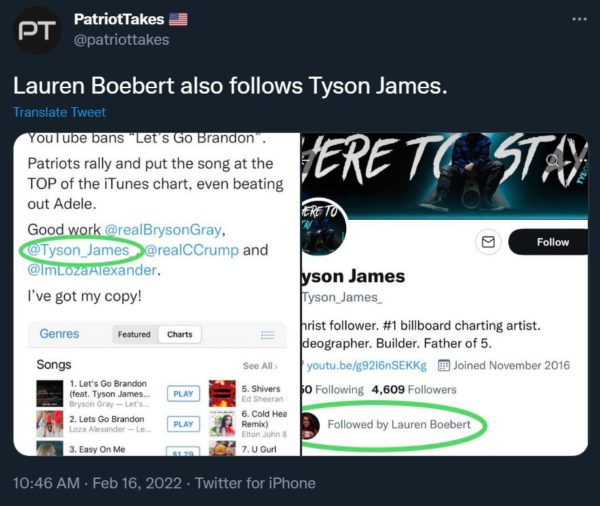
The video for James’s new song, entitled “Toxic,” features the rapper describing being called names due to his stance against accepting the LGBTQ community.
“I’m gonna serve God, I’m toxic,” he raps defiantly. “Ain’t with the LGBTQ, y’all ain’t gonna make it, believe me you, just face it.”
Elsewhere in the track, James criticizes transgender people by rapping, “If you’re born a girl, you’re not a dude!”
As he raps these lines, he spray paints the word “ABOMINATION” onto a rainbow flag, and later is seen in a mask burning a rainbow flag in a trash can.
Editor’s note: The following video is extremely homo/transphobic and offensive. Viewer discretion is advised.


















